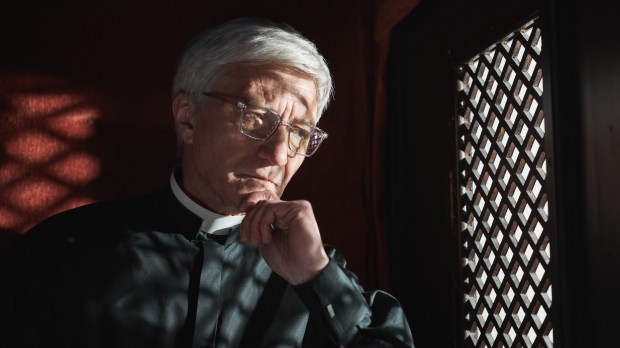In the Roman Rite of the Catholic Church, the celebration of confession is typically separate from what is called spiritual direction.
Confession is one of the seven sacraments of the Church, while spiritual direction is a meeting or series of meetings between a spiritual director — a priest or a trained lay person or religious — and a person seeking counsel in growing closer to God.
Confession
Jesus Christ instituted the sacrament of confession, extending his ministry of forgiveness through the ministry of his apostles. The Catechism of the Catholic Church summarizes this sacrament of God’s mercy.
In imparting to his apostles his own power to forgive sins the Lord also gives them the authority to reconcile sinners with the Church. This ecclesial dimension of their task is expressed most notably in Christ’s solemn words to Simon Peter: “I will give you the keys of the kingdom of heaven, and whatever you bind on earth shall be bound in heaven, and whatever you loose on earth shall be loosed in heaven.” “The office of binding and loosing which was given to Peter was also assigned to the college of the apostles united to its head.
CCC 1444
To be clear, it is God who forgives sins, through the ministry of the priest. In the sacrament of confession, the penitent approaches the priest and relates to him their sins, but is only required to confess in name and number all grave sins.
A member of the Christian faithful is obliged to confess in kind and number all grave sins committed after baptism and not yet remitted directly through the keys of the Church nor acknowledged in individual confession, of which the person has knowledge after diligent examination of conscience.
Can. 988 §1.
The confession of everyday faults has been encouraged by the Church, but is not a necessary part of the sacrament.
In the Roman Rite, confession is typically meant to be brief and to the point, only focusing on the grave sins to be confessed. The priest can offer some words of advice and encouragement, but any long conversation should be reserved for spiritual direction.
Furthermore, Canon Law states that confession should be held in a church or oratory whenever possible, unless for a just cause (see Can. 964 §1.).
Spiritual direction
Here is how the John Paul II Center for the New Evangelization describes spiritual direction.
Spiritual direction is meeting with a trained and experienced director to reflect on how God is present and active in your life right now, and how God might be calling you into deeper relationship. God is the Director; the human director serves as the vessel through which the Spirit works to uncover and discover the Divine at work in your everyday experiences. The content of the direction session is simply your life: whatever aspect, story, or experience you feel moved to bring to prayer and reflection. You the seeker, your director, and the Holy Spirit meet in holy conversation so “you may have life and have it more abundantly.” (John 10:10)Above all, your spiritual director listens and helps you to come clear about the hints and guesses, the invitations, and the “nudgings” of the Spirit in your life.
Spiritual direction is not psychotherapy or counseling and the best spiritual director will normally not tell you what to do. Instead, a good spiritual director will help you find the Holy Spirit in your life and give you tips on how to discern the best course of action.
Sometimes spiritual direction with a priest might include sacramental confession, but normally they are meant to be separate ministries.
Often spiritual direction is conducted in an office, and is scheduled for an extended period of time. It is during spiritual direction that a priest can offer extensive advice and support, that he would not otherwise have time for during confession.
It’s important to know the distinction between confession and spiritual direction, as then you can know what it is that you seek. If you desire help in your spiritual life, then schedule a meeting with a spiritual director. If you want to be absolved of your sins, then go to your nearby parish and find the schedule times for confession.
Engaging in an extensive spiritual direction session during confession can make further complications, especially if the priest is supposed to be preparing for Mass, or if there is a long line of penitents behind you. This is why it is more appropriate to keep these separate and schedule a spiritual direction time that is different from a confession time.


